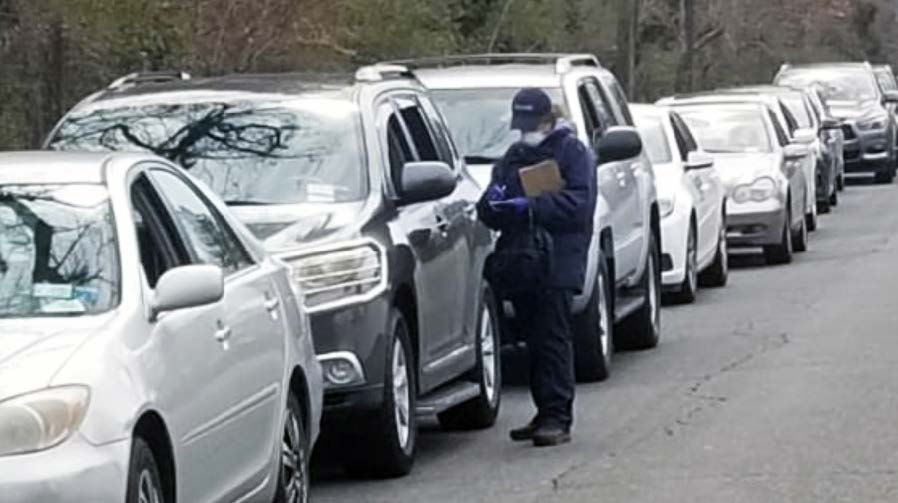For motor vehicle license examiners, policy still leads to potential dangers
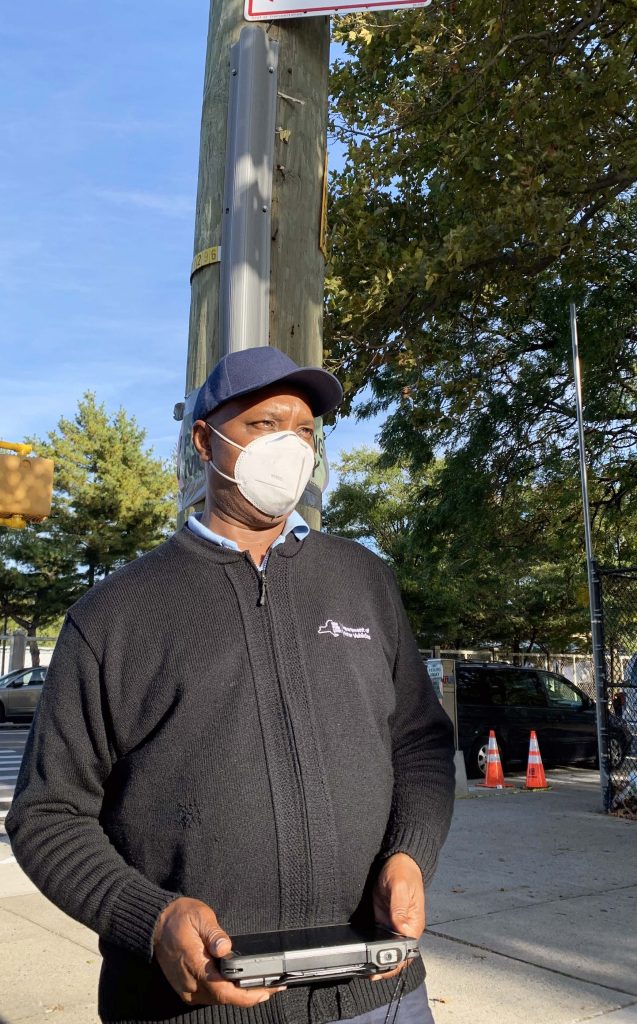
Owen Romeo, a motor vehicle license examiner
at the state Department of Motor Vehicles, stands
near a state road test site in Brooklyn with a
testing device.
Owen Romeo never imagined the last test of the day could potentially turn into the last day of his life.
The Motor Vehicle License Examiner (MVLE) employed by the state Department of Motor Vehicles (DMV) had just returned to the starting point of the road test when the applicant received the news that he had failed.
Romeo, who started with the DMV in January 2020 and is based in Brooklyn, admitted that he notified the applicant of his grade verbally and not by placing the results in an envelope as per new guidelines that were meant as an interim solution to instant notification. He had done the same with nearly 30 applicants throughout the day without incident.
“He started begging me to pass him because he had lost his job due to the COVID pandemic and he was starting a new one and needed his license,” said Romeo.
When Romeo told the applicant that the results were final, that’s when the situation took a turn for the worse.
The applicant left the car cursing, grabbed a bag he had in the rear seat, took a bottle out and threw it at him.
The next few minutes would be filled with terror and a frantic back and forth with the applicant at times running away but then returning with some object to throw at Romeo. At one point, he came close enough to Romeo to land a blow on his chest.
“I would have let it go,” said Romeo, a father of three children. “But he kept coming back and making threats. Every time he went into his bag, I thought he would come out with a gun.”
Eventually, a worker for the driving school the applicant arrived with interceded. The driving school worker wound up wrestling the applicant to the ground and eventually drove him away from the scene. Police arrived a few minutes later and filed a report. The applicant was arrested nearly a month later, even though he threatened to return and “smoke” the place.
Notwithstanding the assault, Romeo said, “I felt sorry for him. This is COVID frustration. People are under a lot pressure.”
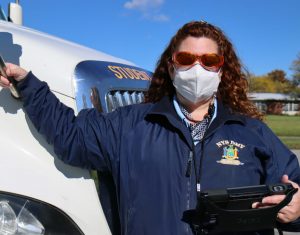
Motor Vehicle License Examiner Lorraine
Corcoran.
Lorraine Corcoran, a CSEA Buffalo State Employees Local member employed as a MVLE, said over the past several months heightened emotions have ruled the day for both the examiner and test takers. On occasion, the test taker may become angry and even act in a physically or emotionally threatening manner, including name-calling, threats and even assaults.
To MVLEs, dealing with this behavior is just part of the job.
“The job of a Motor Vehicle License Examiner is inherently dangerous,” said Corcoran. “The probability of us getting into an altercation or having a bad interaction with a road test client is now at an all-time high. It might have something to do with us living in such troubled times. I don’t know. However, my fight or flight response has turned into a freeze response. That contradicts my survival instincts. It really makes the job a lot more difficult than it should be.”
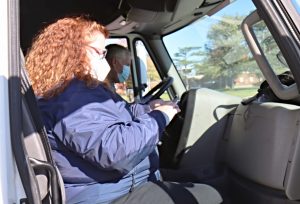
Motor Vehicle License Examiner Lorraine Corcoran conducts a road test in
the Buffalo area.
Corcoran added at times she has had to grab the wheel of the vehicle for fear of being in an accident, had to use all her skills to deescalate a tense situation, or talk calmly to someone whose emotions got the best of them. “Every day is like taking a roller coaster ride — the emotional ups and downs wear on you,” she said.
Policy still a concern
In recent years, motor vehicle license examiners have increasingly reported incidents of physical and verbal workplace violence after road tests due to DMV’s “instant notification” policy in which MVLEs must hand-deliver the results of road tests while inside the test taker’s vehicle.
CSEA has opposed this method of instant notification for years, because it puts MVLEs in danger every day and may violate the state Workplace Violence Prevention Law.

Destine
CSEA DMV (New York City) Unit President Dawn Destine warned that the next MVLE might not be so lucky as Romeo.
“We need to implement a total end to in person, instant notification of any sort,” said Destine, a MVLE herself who has also experienced hostilities from test-takers. “People can be very hostile and we do not have any protection. It’s been a long struggle to end instant notification. After a female worker was assaulted upstate last year, we demanded a change.”
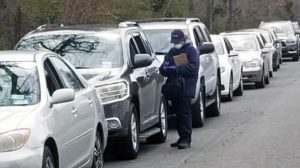
A motor vehicle license examiner in New York City gives a test-taker road
test results.
Following that attack and others, CSEA worked with Department of Motor Vehicles management in 2019 to address the workers’ health and safety concerns. The agency agreed to what has been deemed a “temporary fix,” having MVLEs exit the test-taker’s vehicle and deliver the results via a sealed envelope while standing outside.
Destine warned that the changes are far from perfect. “They are still getting the envelope and getting the results while you are still in the vicinity,” she said.
MVLEs hope the agency will launch a notification policy that would minimize the risks to MVLEs.
While CSEA was working with management to expedite the policy changes, the pandemic and subsequent lockdown may have played a role in delaying the process. Due to the pandemic, road tests were postponed earlier this year. Now that MVLEs are back at work, CSEA and the workers are demanding a critical change that can make their work experience safer.
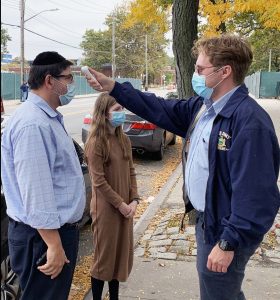
Motor Vehicle License Examiner Volodymyr
Baryshenski takes the temperature of a road
test applicant and driving school representative
before entering the vehicle for the exam.
Doing their jobs
“We are not failing people because we don’t like them,” said Romeo. “I tell applicants we are not out to get you. We are just doing our job. We have guidelines we have to follow and [agency officials]check our work.”
Destine agreed that “we have to change the public view of us. We are regular people that are just trying to do a job and give a fair test and the conditions of the job make it difficult to do, day in and day out.”
While physical altercations happen on occasion, Romeo said verbal abuse from the public is usually more frequent, especially for female workers, yet he opts to think of the rewards.
“It’s not a boring job,” said Romeo. I like working with the public and like to see their faces when they pass.”
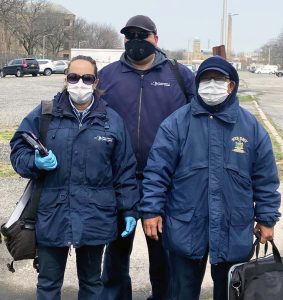
From left, Yolanda Ruiz, Joseph Bermudez and Giaminh Dao, MVLEs
assigned to DMV’s Queens Testing and investigation Unit, prepare to go out
on the job.
Roland Poles, a motor vehicle license examiner based in the Rochester area, said the MVLE job comes with a mix of jubilation and heartbreak.
“It’s extremely satisfying to see clients so joyful when they pass the driver’s license exam,” said Poles. “However, we always have to be on guard when things don’t meet their expectations. Better communication by DMV to clients prior to the exam on exactly what to expect and to have the proper documentation with them beforehand would diffuse a lot of tense situations we experience. In the end, we are just trying to keep the traveling public safe.”
— David Galarza and Ove Overmyer

